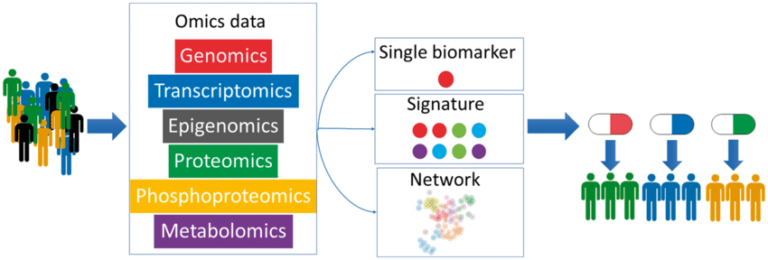Precision Medicine: Using Data Analytics and AI to Personalize Treatment

Precision medicine is the future of healthcare, and thanks to advances in Artificial Intelligence, it is becoming a reality. By analyzing large amounts of data, AI is enabling healthcare professionals to provide personalized treatment plans based on the patient’s unique genetics and medical history, leading to better outcomes and more efficient use of resources.
Artificial Intelligence for Precision Medicine and Better Healthcare
As shown in the image below, AI is already being used in precision medicine for cancer treatment. By analyzing patients’ DNA and medical records, AI algorithms can predict which treatment will work best for each patient, allowing for more targeted and effective treatment options. This not only improves patient outcomes but also reduces the overall cost of treatment by avoiding trial-and-error approaches that can be both time-consuming and expensive.

The use of AI in precision medicine is not limited to cancer treatment, however. As shown in the image below, AI can provide insights into a wide range of diseases, including neurological disorders and heart disease. By analyzing large amounts of data, AI algorithms can identify patterns and trends that traditional methods may miss, leading to more accurate diagnoses and better treatment decisions.
PDX and Personalized Medicine
PDX, or patient-derived xenografts, are being increasingly used in precision medicine to create patient-specific treatments. As shown in the image below, PDX models involve taking tumor cells from a patient and growing them in a mouse or other animal model. This allows physicians to test different treatments on the PDX model to determine which will be most effective for the patient, providing a more personalized approach to treatment.

Another area where AI is being used in precision medicine is drug discovery. As shown in the image below, AI can help identify potential drug candidates by analyzing large amounts of data and identifying compounds that show promise in treating specific diseases. This not only speeds up the drug discovery process but also reduces the overall cost of developing new drugs, making them more affordable and accessible to patients.
Artificial Intelligence for Complex Diagnoses
The use of AI in precision medicine is particularly beneficial for complex diagnoses, such as those involving rare diseases or multiple conditions. As shown in the image below, AI can help identify patterns and correlations that would be difficult or impossible for a human to detect, leading to more accurate diagnoses and more effective treatment plans.

AI is also being used to develop predictive models for various diseases, including Alzheimer’s disease and diabetes. As shown in the image below, AI can be used to analyze multiple factors that contribute to these diseases, including genetic predisposition, lifestyle factors, and medical history. By identifying people who are at high risk of developing these diseases, healthcare professionals can take preventive measures to reduce the likelihood of onset and improve the patient’s quality of life.
Artificial Intelligence in Clinical Trials
Clinical trials are a crucial component of developing new treatments for a variety of diseases, but they can be expensive and time-consuming. AI is helping to speed up the clinical trial process and make it more efficient, as shown in the image below. By analyzing data from clinical trials, AI algorithms can identify patterns and predict outcomes, allowing researchers to make better-informed decisions about which treatments to pursue and which to abandon.

In conclusion, the use of AI in precision medicine is revolutionizing the way we approach healthcare. By analyzing large amounts of data and identifying patterns and trends, AI algorithms are enabling healthcare professionals to provide personalized treatment plans based on the patient’s unique genetics and medical history, leading to better outcomes and more efficient use of resources. From cancer treatment to drug discovery to clinical trials, the possibilities of AI in healthcare are only beginning to be explored. As we continue to develop and refine AI technology, it is certain that precision medicine will become more personalized, more effective, and more accessible to patients everywhere.

Source image : www.crownbio.cn

Source image : amitray.com

Source image : www.kdnuggets.com

Source image : www.kdnuggets.com

Source image : www.kdnuggets.com







